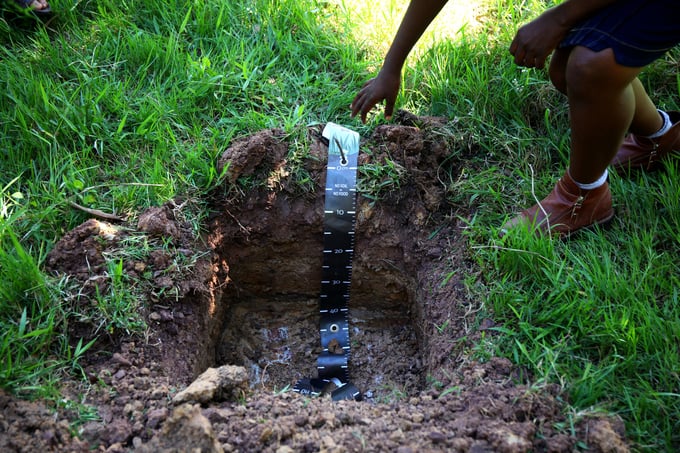November 25, 2025 | 09:49 GMT +7
November 25, 2025 | 09:49 GMT +7
Hotline: 0913.378.918
November 25, 2025 | 09:49 GMT +7
Hotline: 0913.378.918

Healthy and fertile soils are vital in building resilience to the impacts of climate change and transforming agrifood systems.
The Food and Agriculture Organization of the United Nations (FAO) has welcomed the announcement of an additional $10 million from the United States Department of State for projects mapping soil fertility in Ghana and Kenya to promote climate-smart agriculture and adaptation measures, resilient crops, fertilizer use efficiency and soil health.
“Not only will the additional funding from the United States bring the benefits of this project to smallholder farmers and their communities in two more countries but it also underlines the vital role that healthy and fertile soils play in building resilience to the impacts of climate change and to transforming our agrifood systems,” said FAO Deputy Director-General Maria Helena Semedo.
World Soil Day announcement
The announcement was made by U.S. Chargé d’Affaires of the U.S. Mission to the UN Agencies in Rome, Rodney M. Hunter, during global celebrations of World Soil Day 2023. “The United States is excited to contribute an additional $10 million of funding for FAO SoilFER soil fertility mapping projects for Ghana and Kenya,” Hunter said, adding that the funding would “strengthen smallholder agricultural production in these countries, mapping the soil needs, and providing technical assistance to farmers so they will be able to improve soil fertility through more efficient use of fertilizer and water. This will support climate-smart agricultural practices, soil health and the use of resilient crops as part of the Vision for Adapted Crops and Soils (VACS) Program.”
The funding will significantly boost progress with FAO’s ambitious SoilFER (Soil mapping for resilient agrifood systems in the Central America and sub-Saharan Africa), which currently focuses on Guatemala, Honduras and Zambia. The first tranche of funding from the U.S. Government ($20 million) enabled FAO to fast track the impact-oriented project in July 2022.
Addressing fertilizer crisis
The project, funded by the U.S. State Department as part of the VACS Program, aims to address the fertilizer crisis – influenced by costs, availability and risks related to inefficient usage – by providing short- to long-term solutions. The goal of enhancing soil fertility and health, as well as resilience to shocks, encompasses an array of activities. These range from comprehensive soil sampling in the field, robust analysis of soil samples in the laboratories, digital soil information systems, fertilization field test and recommendations, sustainable soil management practices to modern technology tools allowing small-scale farmers to access advanced soil information and data.
Central to the effort is the mapping of soil nutrients and functional soil properties at a detailed level through well-designed soil survey and analysis, as well as developing techniques to monitor them over time. This soil information system is an asset to national authorities and can be used in decision-support systems addressing the judicious use of fertilizers.
The additional funding for the two African countries comes amid increasingly prevalent food insecurity on the continent. Nearly one in four people in Africa (24.0 percent) was facing severe food insecurity in 2022. The prevalence of severe food insecurity rose in Northern Africa, Middle Africa, Southern Africa and Western Africa by 0.8, 1.3, 1.5 and 0.3 percentage points, respectively.
(FAO.org)

(VAN) Brazil's COP30 presidency pushed through a compromise climate deal on Saturday that would boost finance for poor nations coping with global warming but that omitted any mention of the fossil fuels driving it.

(VAN) Poultry farmers in the UK have been warned that they could face one of the worst winters yet for bird flu.

(VAN) Prices of main-crop paddy have risen sharply, with jasmine rice hitting 16,100 baht per tonne — the highest level in years.

(VAN) In Brazil, FAO unveiled a series of reports and initiatives showing how sustainable agrifood systems are a solution to the climate crisis.

(VAN) With names like neodymium and dysprosium, rare-earth elements sound exotic — and their perceived scarcity has only added to the mystique.

(VAN) In a new study published in Trends in Biotechnology, researchers used a gene-editing technology called CRISPR to increase a fungus's production efficiency and cut its production-related environmental impact by as much as 61%- all without adding any foreign DNA.

(VAN) A top official in Beijing’s Cop delegation says China is committed to clean energy – but US’s absence is a problem.